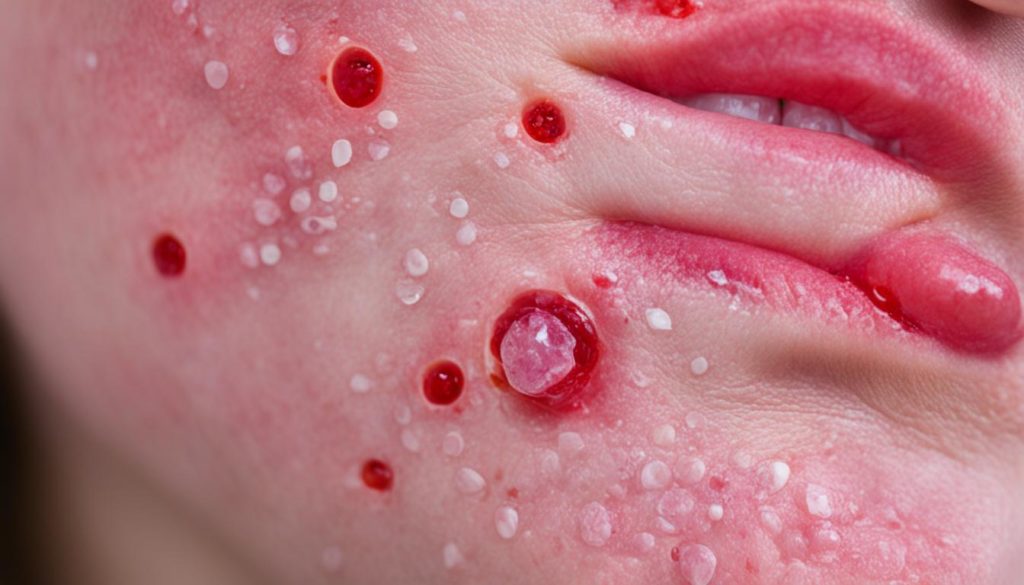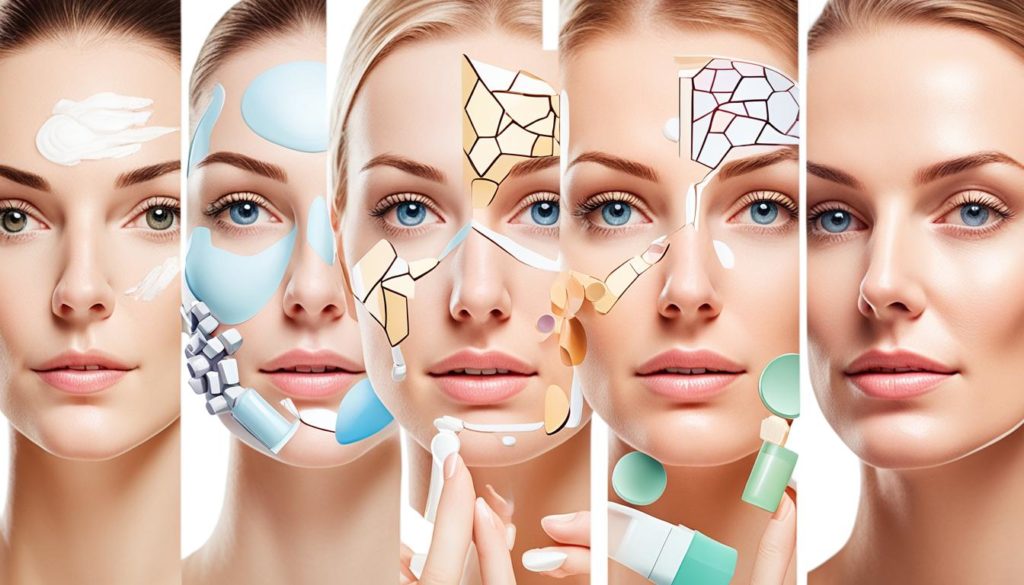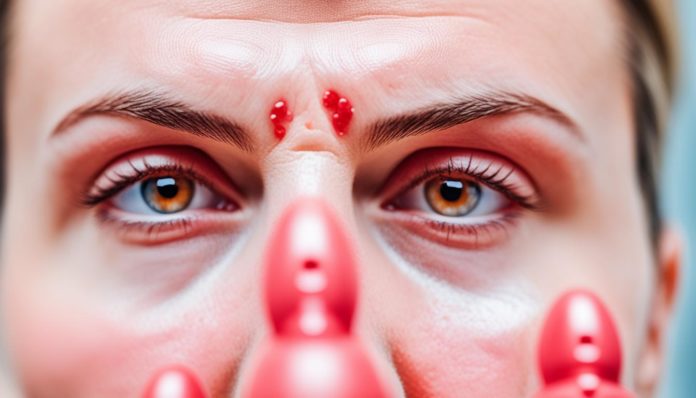Did you know about 85% of young people, ages 12 to 24, battle with acne? While a lot of these cases are treatable at home, knowing when to see a doctor is key. It’s not just about clear skin. A doctor can offer deep care that tackles tough and lasting breakouts.
It’s important to know when to get help for your acne. A dermatologist can give treatments that store-bought products can’t. This could be the relief you’ve been looking for.
Key Takeaways
- A large percentage of individuals experience acne during their teenage years.
- Knowing when to seek medical advice for acne is vital for effective treatment.
- Professional acne care provides tailored and superior skincare solutions.
- Specific acne evaluation criteria help determine the need for a dermatologist.
- Professional treatments can effectively address severe and persistent acne.
Signs Your Acne Requires Professional Attention
It’s vital to know when acne is bad enough to see a skin doctor. Knowing what to look for can stop worse skin damage. This helps in treating acne more effectively.
Persistent Acne Breakouts
Occasional pimples are normal, but constant breakouts are not. If your acne won’t go away, it could be serious. This kind of acne might need care from a skin expert.
Painful, Cystic Acne
Cystic acne means big, sore lumps under the skin that don’t pop. These spots hurt and can scar. When you have cystic acne, you should see a dermatologist.
Worsening of Acne Despite Over-the-Counter Treatments
When store products don’t help your acne, it’s a sign you need a doctor. Over-the-counter treatments don’t always work on bad acne. A skin doctor can offer stronger medicines or other treatments.

Understanding Acne Severity and When to Consult a Dermatologist
Knowing when to see a dermatologist for acne depends on how severe it is. Acne affects everyone differently. By understanding these differences, people can find the best treatment.

Levels of Acne Severity
Acne is often seen in three levels: mild, moderate, and severe. Mild acne might show up as the occasional pimple or blackheads. Moderate acne includes more breakouts that spread over bigger areas of the face or body. Severe acne means you get painful cysts and a lot of redness, which can scar if not treated.
Seeing a dermatologist can help you understand your acne and get a plan to manage it. Getting help is crucial, particularly for severe acne, to prevent scars.
Impact on Daily Life and Self-Esteem
Acne’s effect on one’s feelings is big. It can lower self-esteem and increase stress, making daily tasks harder. The way acne looks and feels can really affect how we deal with it.
A dermatologist does more than just look at your skin. They also support you emotionally, knowing acne can hurt your mental health. With the right treatments, your skin and how you feel can get much better.
Types of Acne That Usually Require Medical Intervention
Acne appears in different forms. Knowing which types need a doctor’s help can change treatment results. Getting help from a dermatologist for acne evaluation is often needed for severe cases. Let’s look at the acne types that usually require medical help.
1. Nodular Acne: Nodular acne means large, painful lumps under the skin. These nodules are deep and can last for a long time. Over-the-counter treatments don’t work well for them. That’s why seeing a dermatologist for acne evaluation is crucial.
2. Cystic Acne: Cystic acne is the most serious kind of acne. It looks like deep, inflamed, pus-filled cysts that can scar. Handling this acne type often needs prescription meds and professional procedures.
3. Acne Conglobata: This severe acne type has inflamed nodules connected under the skin. It leads to heavy scarring and doesn’t respond well to normal treatments.
Spotting these acne types early and getting a dermatologist for acne evaluation helps with better and faster treatment. Let’s summarize these severe acne types:
| Type of Acne | Description | Treatment Necessity |
|---|---|---|
| Nodular Acne | Firm, large lumps beneath the skin | High – requires dermatologist evaluation |
| Cystic Acne | Deep, inflamed cysts with pus | Very High – needs severe acne treatment |
| Acne Conglobata | Interconnected nodules with sinus tracts | Extremely High – urgent medical intervention |
Understanding the importance of severe acne treatment and seeing a dermatologist for an evaluation ensures the right care and plans for each person’s needs.
Why Seeing a Dermatologist Can Make a Difference in Acne Treatment
Seeing a dermatologist for acne care can really change how well your skin looks. They give advice and treatments that really fit your skin’s needs. This means you get care that works for you.
Specialized Acne Treatments
Dermatologists have special treatments for different kinds of acne. They use things like chemical peels and special medicines. These treatments can do a better job than what you find in stores. They help calm your skin, heal it, and stop new acne from starting.
Customized Skincare Regimens
When you work with a dermatologist, you get a skincare plan made just for you. This plan uses products that are right for your skin type. It can include things like face wash, moisturizers, and other care products. This helps make sure your skin gets the best treatment.
Access to Cutting-Edge Research and Products
Dermatologists know all about the latest skin care science and products. This means they can offer you new treatments that you can’t just buy in stores. Getting the latest treatments can make your skin better faster.
| Benefits | Professional Dermatologist Care | Over-the-Counter Products |
|---|---|---|
| Effectiveness | High – Customized and targeted | Variable – General formulations |
| Personalization | Tailored to individual skin types | Generalized for mass market |
| Advancements | Access to latest research and treatments | Limited to available store products |
| Results | Faster, more noticeable improvements | Slower, inconsistent outcomes |
Benefits of Professional Acne Care
Dealing with stubborn acne? Professional acne care is a game changer. It ensures you get a correct acne diagnosis from a dermatologist. This is crucial to creating a plan that really works.
Tailored acne treatment plans are a major plus. They’re made just for your skin type and acne severity. Dermatologists can use different treatments. These range from creams and pills to special office procedures.
Professional acne care means having a skincare expert regularly check your progress. They can change your treatment if needed. Plus, you’ll learn how to take care of your skin and make smart lifestyle choices.
Choosing professional acne care brings personalized help from experts. It’s perfect for dealing with tough or ongoing acne. You’ll get a solid plan that tackles both symptoms and the root cause of your acne. This includes an accurate acne diagnosis and custom-fit acne treatments.
Exploring Advanced Acne Treatment Options
When acne gets severe, looking into advanced treatments can really help. Dermatologists have many new treatments to offer. These include prescriptions and laser or light therapies. Let’s dive into these solutions:
Prescription Medications
Prescription medications are a key way to battle severe acne. Topical treatments like retinoids and oral antibiotics are common. They fight the causes of acne by reducing inflammation and killing bacteria. Dermatologists customize these treatments for each person’s skin, which helps a lot.
In-Office Procedures
There are also treatments done right in the dermatologist’s office. Chemical peels are one. They clear out dead skin cells that clog pores. Microneedling is another method that helps by boosting collagen and improving skin texture. These treatments give quick results and are closely watched by a dermatologist.
Laser and Light Therapies
Laser and light therapies are new ways to tackle acne. They don’t require surgery and are very effective. Blue light therapy kills acne-causing bacteria. Laser resurfacing works on reducing scars and making the skin look better. These options are advanced, with little downtime and great precision.
When Over-the-Counter Treatments Aren’t Enough
Over-the-counter (OTC) treatments are a first step for mild acne but often don’t work for severe cases. Persistent and painful breakouts usually ignore OTC solutions. This signals the need for expert acne care. Severe acne isn’t just about looks. It might show deeper skin problems needing special treatment.
Seeing a dermatologist for acne evaluation reveals problems OTC products miss. Dermatologists provide care that matches your acne type and its severity. Their methods don’t just hide acne. They tackle the underlying cause for better results.
- Ineffectiveness for severe acne conditions
- Potential for skin irritation and worsening symptoms
- Inability to tailor treatment to individual skin types and causes
Ignored by OTC products, persistent acne suggests the need for better care. Professional treatments offer access to specialized options. These options aren’t found in over-the-counter products. They can stop ongoing acne and avoid scars.
If OTC treatments can’t clear your acne, professional help might be necessary. Choosing a dermatologist for acne evaluation is a smart move. It helps get clear skin and improve skin health.
The Role of a Skincare Specialist for Acne
Seeing a skincare specialist for acne can change how you tackle this widespread skin issue. These experts have deep knowledge and skills. They focus on making customized skincare regimens just for you. They look at your skin type, how severe your acne is, and your history to find the best plan.
- Professional Skin Analysis
- Personalized Treatment Plans
- Expert Advice and Guidance
A great benefit of talking to a skincare specialist for acne is getting treatments that fit your unique skin. This approach avoids the guesswork of store-bought products. It leads to quicker, more dependable outcomes.
With customized skincare regimens, clients see better skin texture and less inflammation. Breakouts happen less often. These experts know the latest research and products. This helps them give the best care. Let’s talk about what they focus on:
| Focus Area | Description |
|---|---|
| Personalized Skincare | Creation of unique plans for different skin types and needs. |
| Targeted Treatments | Special solutions aimed at the main cause and type of acne. |
| Ongoing Support | Constant advice and tweaking of treatments as you progress. |
Finally, getting help from a skincare specialist for acne really makes a difference. By making customized skincare regimens, they offer focused and efficient treatments. This leads to healthier, clearer skin.
The Process of Getting an Acne Diagnosis from a Dermatologist
Starting your acne care journey involves a detailed check-up by a dermatologist. This includes many steps to make sure they understand your skin condition well. This helps in creating an effective plan for your treatment.
First, your dermatologist will closely look at your skin. This helps them figure out what kind of acne you have and how severe it is. They might do extra tests to check for other skin problems. They will also talk about your health history and any past acne treatments or medicines you’ve taken.
After checking your skin, your dermatologist will suggest treatments that fit your needs. These could be creams, pills, or even special procedures for tough cases. You can learn more about this by visiting the NIAMS site.
Good acne care isn’t just about treating pimples. It’s about stopping new ones from forming and keeping your skin healthy for the long run. With a dermatologist’s help, you get a full plan. This includes medical treatments and tips on skin care routines, like using the right sunscreen and avoiding things that make acne worse. This way, you get care that’s just right for your skin.
FAQ
When is it necessary to see a doctor for acne treatment?
You should see a doctor if you keep getting acne, have painful cysts, or if store-bought treatments don’t work. Going early can get you the right care and stop worse skin damage.
What are the signs that my acne requires professional attention?
Signs you need a doctor include constant breakouts, painful cysts, and acne that gets worse with store-bought treatments. This means you might have severe acne that a specialist should treat.
How is acne severity classified?
Doctors categorize acne as mild, moderate, or severe. This helps them figure out the best treatment. Severe acne, like nodular or cystic acne, usually needs a doctor’s help to get better.
Why should I consider seeing a dermatologist for my acne?
A dermatologist gives you access to expert treatments, custom skincare plans, and the newest products. They can give better results than treating yourself, as they give personal advice and track your progress.
What types of acne usually require medical intervention?
Nodular and cystic acne types often need a doctor’s care. These severe forms hardly improve with just store-bought treatments. A dermatologist can offer the right care for them.
What are the benefits of professional acne care?
Getting professional help offers accurate diagnosis, treatments that really fit you, and regular checks from a skin expert. These lead to effective treatment and allow changes if needed.
What advanced acne treatment options are available from dermatologists?
Dermatologists offer advanced treatments, like prescriptions, office procedures, and the latest laser and light therapies. These can better tackle tough acne than common treatments.
When are over-the-counter acne treatments not enough?
For severe or lasting acne, store-bought treatments might not help. In these situations, seeing a dermatologist is best. They can give stronger treatments and plans made just for you.
What role does a skincare specialist play in acne treatment?
A skincare specialist is key in tackling acne. They make customized care plans based on your skin type and acne severity. They choose specific treatments to effectively solve your acne problems.
What is the process for getting an acne diagnosis from a dermatologist?
To diagnose acne, a dermatologist does a detailed check-up, skin tests, and talks about your health history. This makes sure they understand your situation well and plan the best treatment for you.


